My mother took the Culligan Man to task not long ago. Not the flesh-and-blood Culligan Man, but the actor on TV.
A Culligan Water Systems ad on TV showed a young mother and her child. Suddenly, ominous music played as the mother drew tap water from her faucet. A voice-over warned of potential impurities lurking in our water…and what they could mean to our family.
The voice-over, now much more chipper, then announced that Culligan was offering free water-quality testing. Here was our chance to protect our families…to save the children.
My mother scoffed. “Yeah, and then they’ll just say your water is bad and try and sell you something.”
Let’s get this third-party started
My mom’s attitude is something we’ve run into at AMSOIL a time or two.
We’ve published test results showing the superiority of synthetic lubricants compared to conventional lubricants for years. Not just AMSOIL synthetic motor oil, but other synthetic oils as well. I told you about some of those tests in this blog post. In a nutshell, synthetics offer improved wear protection, engine cleanliness, cold-flow and resistance to viscosity loss than conventional oils. That translates into a longer-lasting, higher-performing engine.
But our test results don’t convince some people. Skeptics demand proof from an objective third party. Anything else is thinly disguised marketing meant to sell you something. Kind of like my mother with the water-quality test.
The American Automobile Association (AAA), a reputable, third-party organization, recently published an in-depth report that affirms what we’ve been saying for more than 45 years: synthetics outperform conventional oil. In conducting its test, AAA sought to determine if it’s worth paying more for synthetic oil over conventional oil.
The answer is a resounding “yes.”
Here’s what John Nielsen, AAA’s managing director of Automotive Engineering and Repair, said:
Oil protects critical engine components from damage and AAA found that synthetic engine oils performed an average of 47 percent better than conventional oils in a variety of industry-standard tests. With its superior resistance to deterioration, AAA’s findings indicate that synthetic oil is particularly beneficial to newer vehicles with turbo-charged engines and for vehicles that frequently drive in stop-and-go traffic, tow heavy loads or operate in extreme hot or cold conditions.
AAA Testing
AAA’s research included eight industry-standard ASTM tests focusing on the following:
- Shear stability
- Deposit formation
- Volatility
- Cold-temperature pumpability
- Oxidation resistance
- Oxidation-induced rheological changes
Each test was performed on five synthetic and five conventional oils. Unfortunately, they don’t reveal which oils they tested.
Here’s a look at some of the results.
Extreme-heat resistance
The NOACK Volatility Test determines the evaporation loss of lubricants in high-temperature service. The more motor oils vaporize, the thicker and heavier they become, contributing to poor circulation, reduced fuel economy, increased oil consumption and wear. The lower the number, the better the resistance to vaporization.
As you can see, the synthetic oils (the green bars) demonstrated lower volatility than the conventional oils (the blue bars). That translates into a cleaner, better-running engine for you.
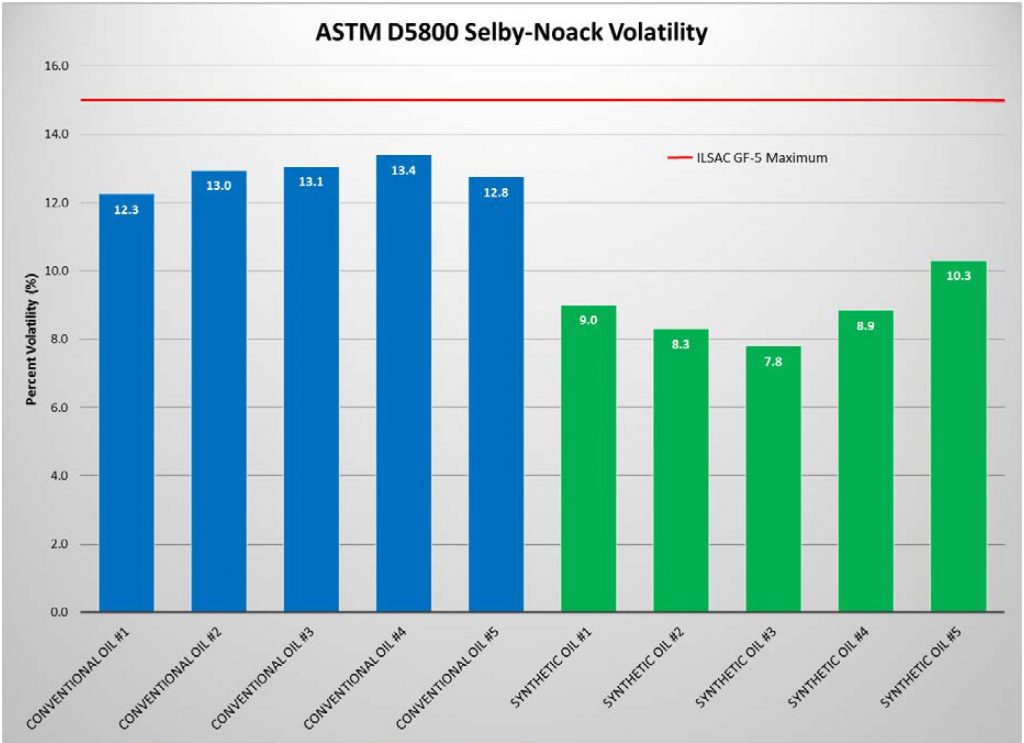
Deposit resistance
The Thermo-Oxidation Engine Oil Simulation Test (ASTM D6335) determines the deposit-resisting properties of lubricants in high-temperature service. Motor oils can form deposits when exposed to increased heat, reducing efficiency and contributing to poor overall performance. The lower the number, the better the resistance to deposit formation.
Here, two of the conventional oils failed to limit deposits below the minimum standard to meet the ILSAC GF-5 specification, while all the synthetic oils remained under the threshold.
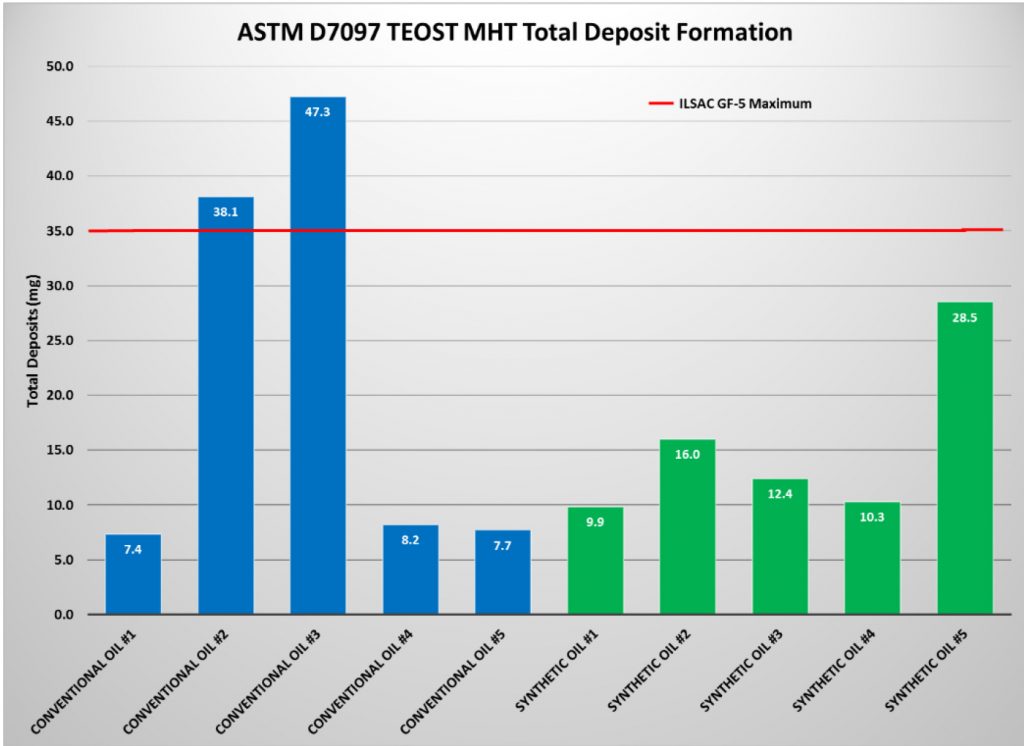
For years we’ve been saying synthetic oils outperform conventional oils. The AAA report offers yet another example of just how much better synthetics are for your vehicles.
Even my mother can’t scoff at that.
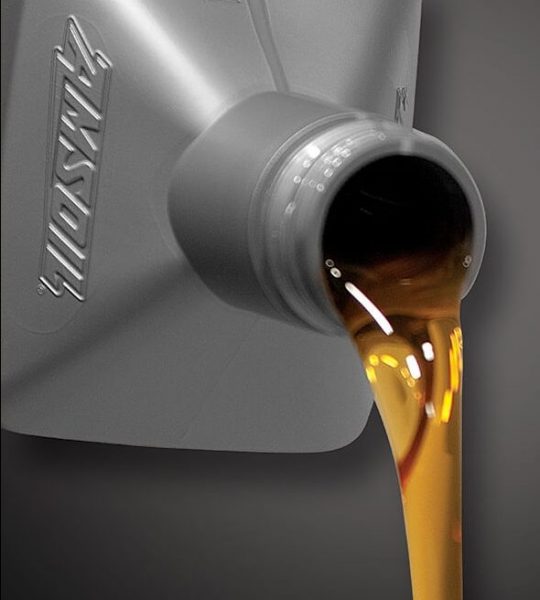
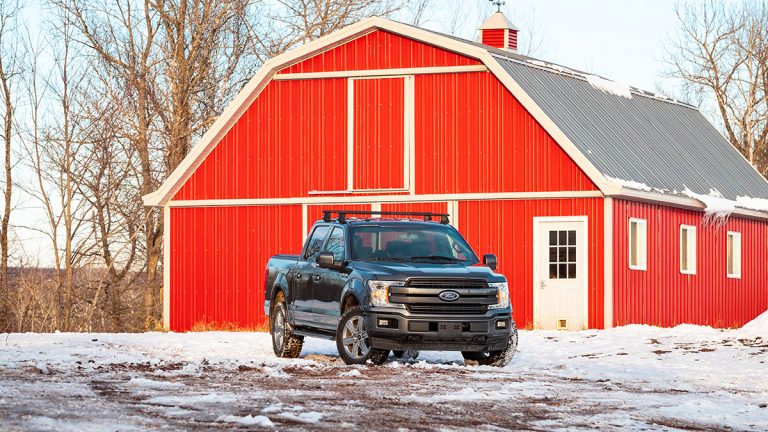
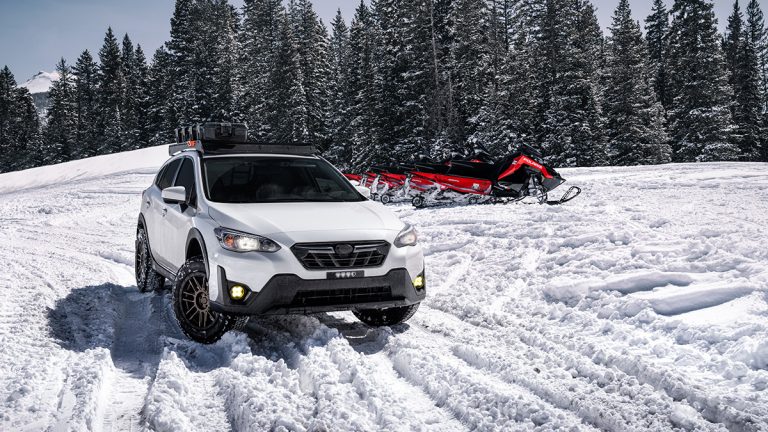
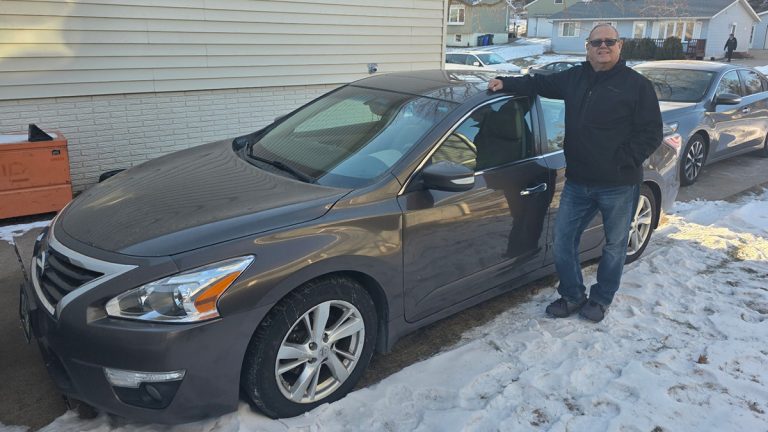

About a year and a half ago, I bought a used ’12 Camry with 23k miles on it. My brother, who has a Toyota Matrix with 350k miles on it, *swears* by your oil. Since his recommendation, I began running your oil in my Camry. I recently acquired an ’07 Matrix for my son with 111k miles on it. I found a “Lube N’ Go” receipt in the glove box, so I knew there was no hope it was running synthetic oil.
I share this with you because I could *feel* the difference in how that Matrix ran when I changed the oil to Amsoil. I don’t feel like I need any convincing from you or AAA that your product is excellent.
Also, FYI, the Toyota dealership looked at me like I was nuts when they informed me my Camry oil was a little low and I refused to let them top it off telling them they were not to mix the oils. (Amsoil ONLY!)
Thank. You. Amsoil.
PS. Thanks for the stickers you send with my orders. Unfortunately, if you put something like that on your car, you have a mess to deal with if you want to replace it. Thus, your stickers sit in my garage. (My brother told me, “Yeah, I have a metal trash can in the garage that is plastered with them.”) If you sold (or shared!) a static cling version, I would gladly put it on my car with confidence that I would not later have an adhesive mess.
Hi Amy,
Thanks for your story and your loyalty to AMSOIL. In fact, we do offer both magnetic and static-cling decals.
Your story echoes an experience I had with a Honda CR-V my wife and I recently bought. We had it in the shop to fix a chronically low tire. A day after we picked it up, the brakes started grinding. Long story short, the mechanic thought he should have noticed the brakes needed changing while he had the tire off, so he changed the oil for free as a favor. “Umm, did you use AMSOIL?” my wife asked. Of course he didn’t. So I’ll be draining that oil out and using it as bar and chain oil in my chainsaw.
Thanks for reading.
I had a tire shop which offers oil change the oil and cabin filters and oil with AMSOil and a WIX made NAPA cabin filter. They put another sticker in the car with a six month date, so I crossed out the name and wrote AMSOil and a 12 month date and 15000 mile change number. I like them but not that much, they still got to rotate the tires when it hit 5000 miles and the tire pressure sensor was activated.
Hi John;
Theoretically all the synthetics should have performed relatively close in results,if “Synthetic” meant any real spec requirement. Sort or like a “generic drug”, with same name but differing producers, for the same condition.
Producers may or may not be adding varying amounts of the API Lube Class III+ ,to their lube base, to call it “synthetic”,and the AAA results show definitively that those quality specs do vary dramatically. So AAA did not go far enough in their research,whether naming brands or not, since they only proved better results,but not how or why is was such, which ,I Guess, was not their purpose. That is OUR job, as Presenters and Marketers. Big box stores have no method of ,nor capability ,to do what we do to differentiate “Real Synthetic” —100% types to users. But Amsoil IS catching on ,and dramatically ,since “synthetic” is the word in protection of our engines, in recent months.
Thanks for being a good son to Mom ,. and for your great work.
Big Al B
Hi Al,
Yes, there are variations in performance from one synthetic oil to the next, as our testing has shown. But, as you said, I doubt the AAA’s test was designed to drill down to that level of detail. I think their purpose was to simply answer the high-level question: Is synthetic oil better than conventional?
The average motorist doesn’t find the details about group III base oils compared to PAOs interesting (unlike us!).
Thanks for reading.
I’ve tried synthetics and with having a 105000 miles the seals leak (crankshaft seals). So I had to go back to conventional oil. I know the benefits of synthetic but not at the expense of leaks.
Hi Mike,
Sometimes, when using conventional oil, deposits can form in the engine that mask seal deficiencies, effectively helping prevent them from leaking. Switching to a synthetic oil with higher-quality detergents can clean up those deposits, revealing the true condition of the seals. The bottom line is that a properly formulated synthetic oil, regardless of brand, won’t cause seal leaks. If you’re interested, check out a field study we did using taxi cabs in Las Vegas that shows excellent seal protection for the engine and transmission.
Thanks,
John
Do any of the oils tested look like AMSOIL? If not, where would AMSOIL fall in those tests.
A owner-operator account of mine – a semi-truck owner, tells of his experience at a truck stop after going up the Coquihalla Summit. His transmission temperature stays within allowable range but passes more than one truck that limps in the slow lane at a snail’s pace. At the truck stop this guys asks what he uses for oils. Without blinking an eye he admits to using AMSOIL.